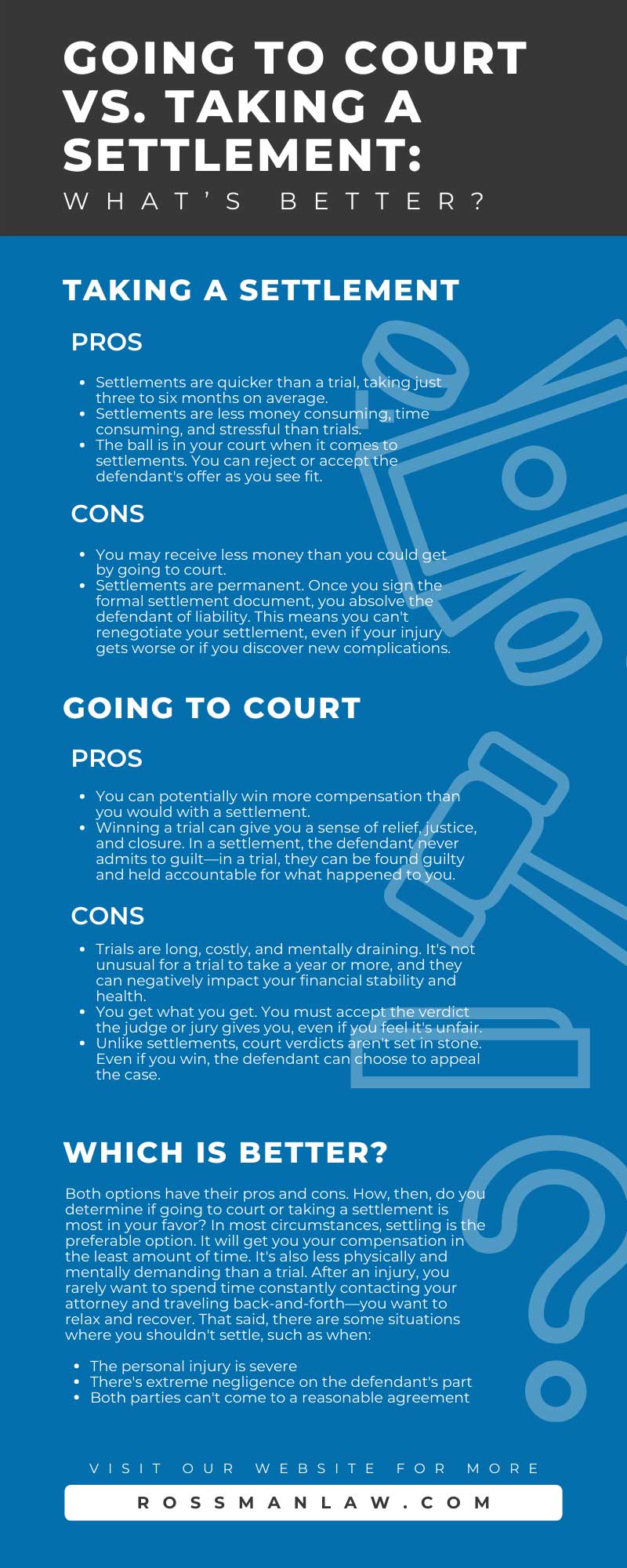
Does Workers’ Compensation Cover Car Accidents on the Job?
June 16, 2022
The 5 Most Dangerous Cars on the Road in America
June 27, 2022If you were harmed by no fault of your own and want to open a personal injury case, you may assume your only avenue for seeking compensation is to stand trial. While standing trial is one way to establish liability and receive the compensation you deserve, it isn’t your only option. To save time, money, and prevent stress, many plaintiffs choose to settle their case before it makes it to court.
If you’re unsure whether going to court or taking a settlement will yield better results for your case, read on for more information on both processes and their pros and cons.
Taking a Settlement
A settlement is when the case is formally resolved before it heads to court. You can reach a settlement at any point during the litigation process. In some cases, you can reach a settlement before a lawsuit is ever filed or as late as a day prior to trial.
While the process of reaching a settlement varies from case to case, most play out similarly. To start, the attorney of the plaintiff writes and sends a demand letter to the defendant’s insurance company. This letter contains plaintiff’s demanded compensation, the legal reasoning behind the demand, and evidence to support the reasoning.
Once the defense attorney receives and reviews the demand letter, they send a formal response to it and will occasionally make a counteroffer. This starts a discussion between both parties, who communicate via email, phone, or meetings to resolve the problem at hand. If both parties can reach an agreement, they sign a formal settlement document, including a release of liability, and the case concludes without the need for a trial.
There are pros and cons to taking a settlement. These include:
Pros
- Settlements are quicker than a trial, taking just three to six months on average.
- Settlements are less money consuming, time consuming, and stressful than trials.
- The ball is in your court when it comes to settlements. You can reject or accept the defendant’s offer as you see fit.
Cons
- You may receive less money than you could get by going to court.
- Settlements are permanent. Once you sign the formal settlement document, you absolve the defendant of liability. This means you can’t renegotiate your settlement, even if your injury gets worse or if you discover new complications.
This plan of action is quick, easy, and guarantees you get something for your troubles. An attorney can help you get the most out of a personal injury settlement so you can feel satisfied with the outcome of your case.
Going To Court
During a trial, both parties argue their cases in front of a judge or jury. At the end of the trial, the judge or jury determines if the defendant is responsible for the plaintiff’s damages. Typically, trials have six phases, which are as follows:
- Assembling the jury
- Opening statements
- Witness testimony and cross-examination
- Closing statements
- Jury instructions
- Deliberations and delivery of the verdict
Trials can take anywhere from a week to over a year to resolve and call for heavy preparation from both attorneys. They can be pricey and stressful, but they can also have extremely satisfying outcomes that make them worth the time and effort.
Heading to trial has its pros, but it also has its fair share of cons. Here are a few reasons to go to trial and a few reasons to avoid it:
Pros
- You can potentially win more compensation than you would with a settlement.
- Winning a trial can give you a sense of relief, justice, and closure. In a settlement, the defendant never admits to guilt—in a trial, they can be found guilty and held accountable for what happened to you.
Cons
- Trials are long, costly, and mentally draining. It’s not unusual for a trial to take a year or more, and they can negatively impact your financial stability and health.
- You get what you get. You must accept the verdict the judge or jury gives you, even if you feel it’s unfair.
- Unlike settlements, court verdicts aren’t set in stone. Even if you win, the defendant can choose to appeal the case.
While risky, going to trial can pay off big time. Consult with a professional before taking your case to trial to ensure it’s the correct option for you.
Which Is Better?
Both options have their pros and cons. How, then, do you determine if going to court or taking a settlement is most in your favor? In most circumstances, settling is the preferable option. It will get you your compensation in the least amount of time. It’s also less physically and mentally demanding than a trial. After an injury, you rarely want to spend time constantly contacting your attorney and traveling back-and-forth—you want to relax and recover. That said, there are some situations where you shouldn’t settle, such as when:
- The personal injury is severe
- There’s extreme negligence on the defendant’s part
- Both parties can’t come to a reasonable agreement
In rare cases, a court case may be able to establish precedent for future cases. In these circumstances, going to court can greatly benefit you and others in a similar situation to yours. Consult your attorney to see if your case is of this sort.
However, circumstances vary wildly from case to case, which can make it difficult to determine whether going to court or taking a settlement will yield the most desirable outcome. If you’re unsure of which option is most beneficial to your case, consulting an experienced attorney can be helpful. An attorney will review your case and determine if going to trial is worth the additional time and money commitment.
If you need a hospital negligence attorney that will do what’s in your best interest and get you the outcome you deserve, get in touch with Rossman Law Group. We’re an Idaho-based law firm that’s aggressive, successful, and dedicated to you and your case. Contact us today for a free consultation with a professional and friendly member of our firm.






